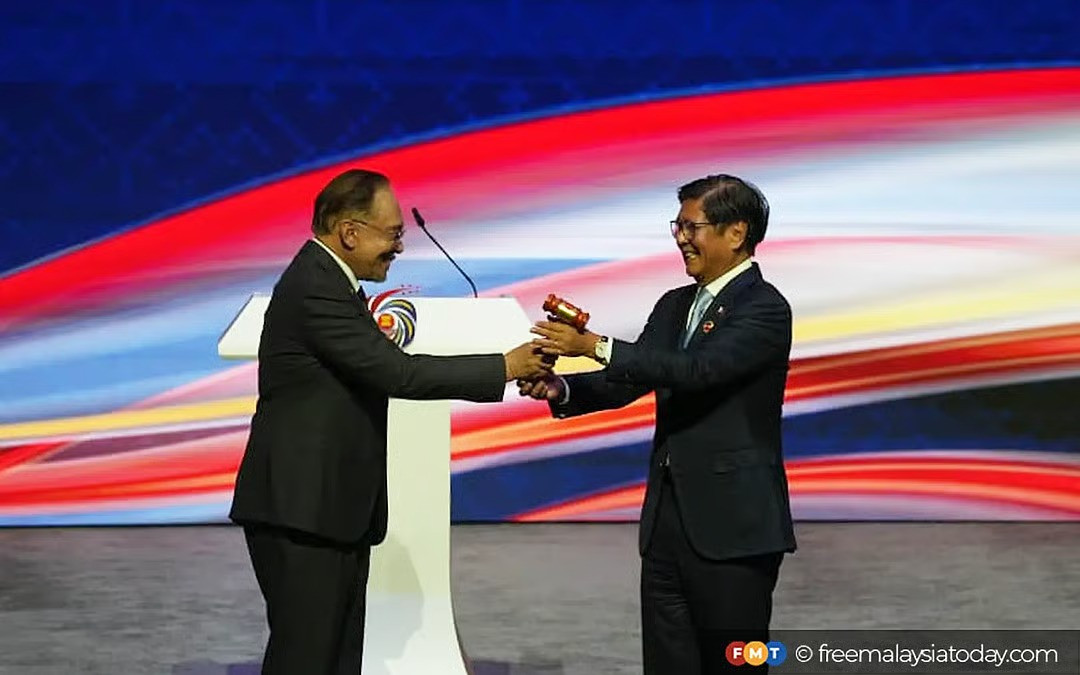Popular Reads
Top Results
Can't find what you're looking for?
View all search resultsPopular Reads
Top Results
Can't find what you're looking for?
View all search resultsAnalysts urge Philippines to build on Malaysia-led ASEAN geopolitical, economic progress
Change text size
Gift Premium Articles
to Anyone
A
s the Philippines is set to take over the Association of Southeast Asian Nations (ASEAN) chairmanship from Malaysia in 2026, analysts have said that continuity and sustained momentum are essential in safeguarding the region’s peace and prosperity.
Faiz Abdullah, the chairman of Malaysia’s Institute of Strategic and International Studies (ISIS), warned against letting Malaysia’s recent diplomatic breakthroughs fall to the side.
Highlighting the first-ever ASEAN–Gulf Cooperation Council (GCC)–China trilateral summit, Faiz said its progression could redefine regional cooperation and development, but only if improvement was maintained.
“You have a combination of dynamic forces at play. ASEAN and the GCC are already formidable, and with China in the picture, there’s a lot more depth,” he said in ISIS Malaysia’s ASEAN Moment podcast.
“China is technologically advanced, and its financial infrastructure complements the GCC’s deep resources.”
Meanwhile, veteran diplomat Ilango Karuppannan called on the Philippines to build on Malaysia’s progress in addressing issues surrounding the South China Sea and Myanmar.
Ilango, Malaysia’s former ambassador to Singapore, opined that both matters must be handled within an ASEAN framework and free from interference by external powers.
“The Philippines has a major role to play. It won’t be easy, but Malaysia and the others are ready to help,” he said, noting that Malaysia remains the ASEAN–China relations coordinator until 2027.
On Myanmar, Ilango emphasized that ASEAN’s special envoy to the war-torn nation should serve for more than a year.
Under ASEAN’s rotating chairmanship, each new chair appoints its own special envoy to mediate between Myanmar’s warring factions and coordinate the implementation of the bloc’s five-point consensus peace framework. The organization has been exploring the idea of appointing a permanent envoy under Malaysia’s chairmanship.
“Perhaps under the Philippines, we could agree to have a permanent envoy, someone who serves for several years and provides continuity,” Ilango said.
Faiz echoed the sentiment, adding that a permanent envoy would be crucial for progress.
“Just as things begin to settle (after a year), the envoy is replaced by someone new. Continuity is a major issue, and resolving that should be one of the Philippines’ key priorities.”
Realising potential
Joanne Lin, a senior fellow at Singapore’s ISEAS–Yusof Ishak Institute, agreed that Malaysia’s “ambitious” chairmanship had delivered major milestones.
At the same time, she noted that many initiatives remained incomplete, requiring sustained effort by successive ASEAN chairs.
“The ASEAN Geo-Economic Task Force and Industrial Strategy were important steps, but they’re still at a conceptual stage. Greater follow-through is needed to operationalize them through sectoral roadmaps, funding mechanisms and private sector engagement.”
According to Lin, the Philippines could also strengthen ASEAN’s collective voice on key economic issues, noting that the bloc still struggles to communicate a cohesive position on emerging trade and technology issues, especially in response to US tariffs and China’s evolving industrial policies.
“The Philippines could build on this by pushing for a more actionable blueprint, perhaps an ASEAN semiconductor roadmap or digital infrastructure fund, to move the region from coordination to execution,” she said.
While Malaysia’s use of soft power and strategic leadership during challenging geopolitical and economic times has been praised by experts, both Faiz and Lin highlighted some areas that could have been handled better.
Faiz was critical of the lack of progress in revitalizing the East Asia Summit, calling it “a Jurassic institution” that had devolved into “scripted speeches with little strategic engagement”.
“There’s no real will or proper agenda to see specific things done,” he said, noting that the absence of top-level attendees and the US-China rivalry had made consensus difficult.
Meanwhile, Lin said the recent unrest in Indonesia, the Thai-Cambodia border dispute and ASEAN’s slow response to Myanmar’s crisis risked undermining the bloc’s legitimacy in the eyes of ordinary citizens.
“It shows how far ASEAN still is from achieving its own aspirations, as outlined in the ASEAN Community Vision 2045,” she said, adding that ASEAN’s perception of being more focused on diplomacy than on people’s welfare remained a challenge.
To restore confidence, she continues, ASEAN needs to make its people-centric agenda more tangible by investing in inclusive growth, which was the theme of Malaysia’s chairmanship. In addition, it is also imperative that the communication gap is closed so that citizens can see how ASEAN cooperation directly supports jobs, education and community resilience.
“At the end of the day, that’s what truly matters to the people of ASEAN,” Lin concluded.










